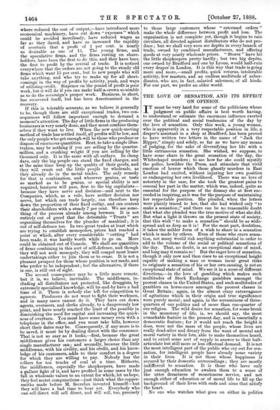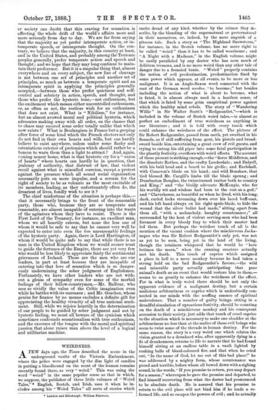THE LOVE OF SENSATION, AND ITS EFFECT ON OPINION.
IT must be very hard for some of the politicians whose judgment on public affairs is best worth having, to understand or estimate the enormous influence exerted over the political and social tendencies of the day by the love of sensation. Only this week, a young woman, who is apparently in a very respectable position in life, a draper's assistant in a shop at Bradford, has been proved to have written two letters in the name of "Jack the Ripper," simply and solely, so far as we have any means of judging, for the sake of diversifying her life with a little extraneous sensation. She wished, we suppose, to have some share in the great sensation of the day, the Whitechapel murders ; to see how far she could mystify the police, bewilder the Press, and stimulate that vivid emotion of horror which these ghastly murders in East London had excited, without injuring her own position or endangering her own livelihood. There was no love of notoriety in the case, for she took the greatest pains to conceal her part in the matter, which was, indeed, quite as essential for the purpose of the dismay she at first suc- ceeded in inspiring, as it was for the purpose of maintaining her respectable position. She pleaded, when the letters were plainly traced to her, that she had wished only "to make a sensation ;" and there can be no reasonable doubt that what she pleaded was the true motive of what she did. But what a light it throws on the present state of society, that this wish "to make a sensation" should be as wide- spread and as deep as it is ! For the most part, doubtless, it takes the milder form of a wish to share in a sensation which is made by others. Even of those who crave sensa- tion, not many would risk anything substantial in order to add to the volume of the social or political sensations of the day. That, no doubt, is an exceptional state of mind, and long may it remain so ! But the eager love of sensation, though it only now and then rises to an exceptional height capable of making a man or woman incur great risks to originate a sensation of his or her own causing, is not an exceptional state of mind. We see it in a score of different directions,—in the love of gambling which makes such multitudes of Stock Exchange gamblers amongst the poorest classes in the United States, and such multitudes of gamblers on horse-races amongst the poorest classes in Great Britain ; again, in the almost crazy extravagance of agitations which in their origin and true significance were purely moral ; and again, in the screaminess of three- quarters of our politics and of more than one-quarter of our religion. The wild desire for sensation, for some break in the monotony of life, is, we should say, the most remarkable feature in the present day, and is essentially a democratic feature ; for it would not reach the height it does, were not the mass of the people, whose lives are really dead-alive and dreary from the want of mental and moral variety in their lots, able to make themselves heard, and to extort some sort of supply in answer to their half- articulate but still more or less effectual demand. It is not the most intelligent part of the public who cry out for sen- sation, for intelligent people have already some variety in their lives. It is not those whose happiness is secured by their domestic surroundings ; they are mostly indifferent to sensation. It is those who have only just enough education to awaken them to a sense of the utter dreariness of monotonous service, and not enough either of education or of moral life to fill up the background of their lives with ends and aims that satisfy the heart.
No one who watches what goes on either in politics or society can doubt that this craving for sensation is affecting the whole drift of the world's affairs more and more seriously from day to day. We are far from saying that the majority as yet prefer intemperate action, or in- temperate speech, or intemperate thought. On the con- trary, we believe that the majority, in this country at least, and in the United States, and probably among the Teutonic peoples generally, prefer temperate action and speech and thought; and we hope that they may long continue to main- tain their preference. But it is a singular thing that, almost everywhere and on every subject, the new line of cleavage is not between one set of principles and another set of principles, so much as between a temperate spirit and an intemperate spirit in applying the principles generally accepted,—between those who prefer quietness and self- control and sobriety in action, speech, and thought, and those who prefer the hysteric tone,—not enthusiasm, but the excitement which means either uncontrolled enthusiasm, or, as often as not, the restless wish for an enthusiasm that does not exist. What is "Nihilism," for instance, but an almost avowed moral and political hysteria, which advocates making away with all order, on the chance that to chaos may succeed some order totally unlike that which now exists ? What is Boulsngisin in France but a groping after force of some kind which the French electors not only do not find in their own hearts and wills, but can hardly believe to exist anywhere, unless under some flashy and ostentatious exterior of pretension which should rather be a beacon to warn them than a light to attract ? And, again, coming nearer home, what is that hysteric cry for a' union of hearts" where hearts can hardly be in question, that jealousy of authority, that distrust of law, that violent recoil against what is miscalled coercion,-except a protest against the pressure which all sound social organisation necessarily puts on mere impulse, and a scream for the right of society to be as volcanic as the most excitable of its members, leading, as they unfortunately often do, the dreariest of lives, fondly wish to see it ? The chief misfortune of the situation is perhaps this,— that it necessarily brings to the front of the reasonable party, those who, because they are so temperate and reasonable, are almost incapable of entering into the wants of the agitators whom they have to resist. There is the First Lord of the Treasury, for instance, an excellent man, whom we all heartily esteem, but none the less one of whom it would be safe to say that he cannot very well be expected to enter into even the less unreasonable feelings of the hysteric party. Again, there is Lord Hartington, of whom it would be quite safe to say that while there is no Man in the United Kingdom whom we Would sooner trust to guide the fortunes of the Empire, there are yet very few who would be less likely to appreciate fairly the sentimental grievances of Ireland. These are the men who are our leaders, in part at least because they are incapable of entering into that love of sensation which is so danger- ously undermining the sober judgment of Englishmen. Fortunately, we have other leaders who are not with- out a gleam of sympathy even for some of the morbid feelings of their fellow-countrymen,—Mr. Balfour, who sees so vividly the value of the Celtic imagination even while he battles with its unreason ; and Mr. Goschen, whose genius for finance by no means excludes a definite gift for appreciating the healthy vivacity of all true national senti- ment. Still, while we rejoice heartily in the determination of our people to be guided by sober judgment and not by hysteric feeling, we must all beware of the cynicism which sometimes confounds sensationalism with true enthusiasm, and the excesses of the tongue with the moral and spiritual passion that alone raises man above the level of a logical and utilitarian machine.







































 Previous page
Previous page